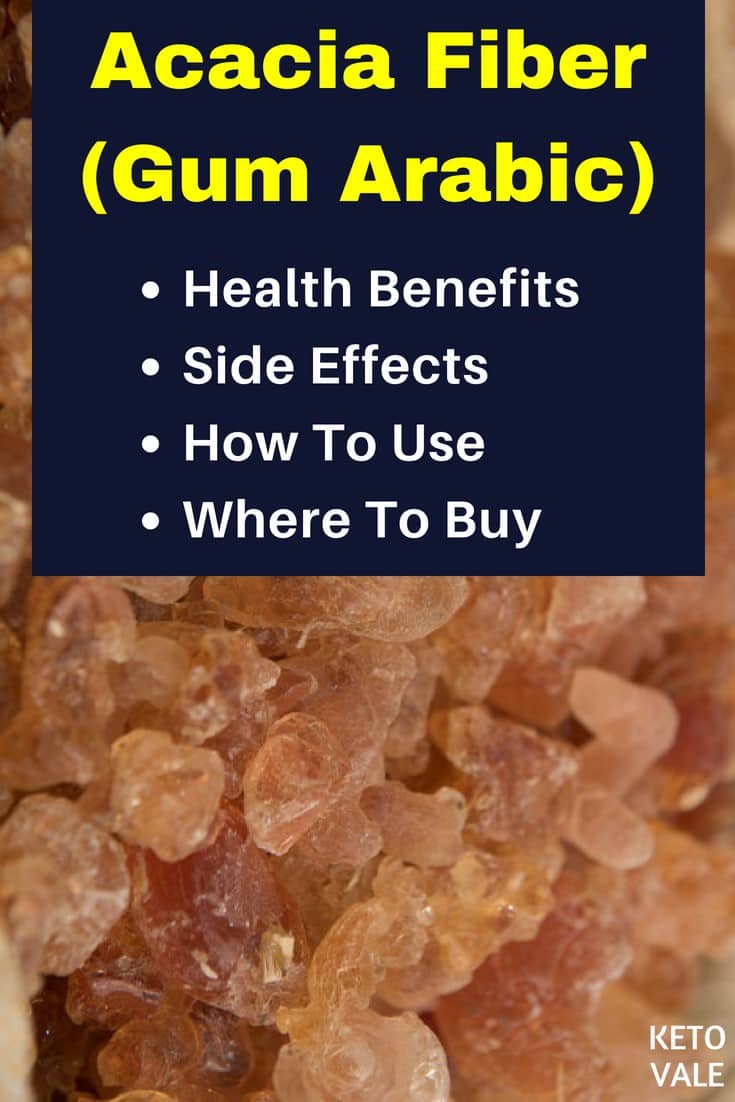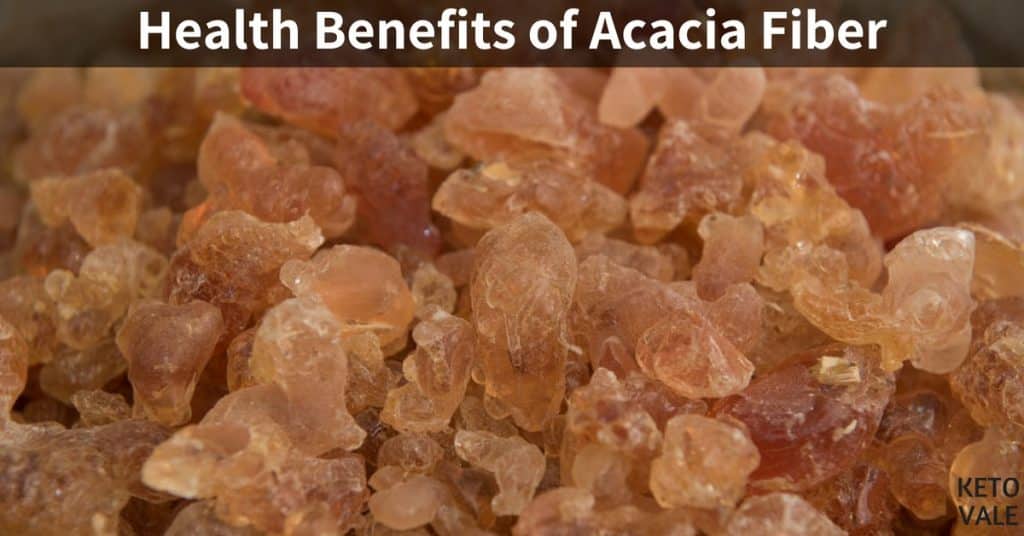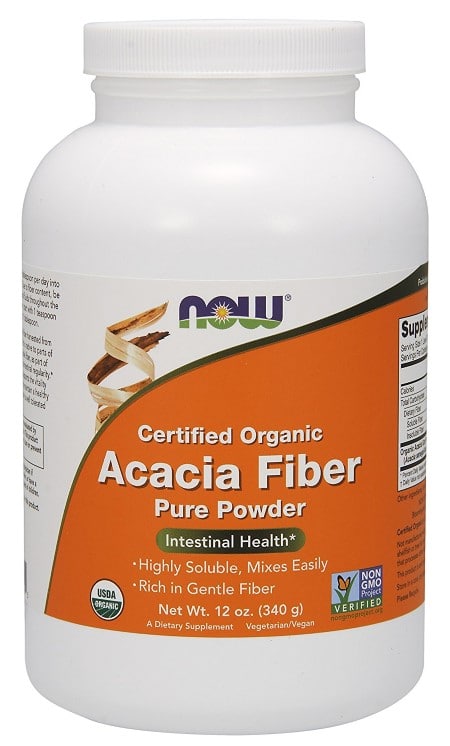Many people struggle to get enough fiber in their diet. However, eating more fiber has benefits that extend beyond digestive health. It can help fight obesity and diabetes, and boost immunity.
Acacia fiber is commonly found in many supplements. It’s a type of soluble fiber that is also used as a thickening agent in certain foods.
Here is everything you need to know about acacia fiber and how to incorporate it into your diet.
What is Acacia?
Acacia fiber is a highly soluble fiber that is sourced from the Acacia tree sap. The acacia mostly grows in Africa and some parts of India and Pakistan. The acacia fiber is also referred to as acacia gum or gum arabic.
Because of its high soluble-fiber content, acacia fiber is commonly consumed as a dietary fiber supplement. In the food industry, gum arabic is used as a thickening agent or an emulsifier.
This fiber has so many amazing health benefits, which is why it’s also used in many ketogenic supplement products. For example, Perfect Keto uses acacia fiber as a carrier to turn their MCT oil into MCT powder.
Top Benefits of Acacia Fiber
#1. Reduces Irritable Bowel Syndrome (IBS) Symptoms
Acacia fiber does not contain substances like artificial sweeteners or gluten. Therefore, it settles easily with most people. It has been proven to reduce symptoms linked to Irritable Bowel Syndrome (1).
According to a study, a composite yogurt that contained acacia dietary fiber as well as probiotic Bifidobacterium lactis was confirmed to have healing properties on subjects with Irritable Bowel Synonym.
Part of 130 subjects for the study who had diarrhea and constipation consumed composite yogurt while the others consumed a control product twice every day. After two months, there was a significant improvement in bowel habit satisfaction with the composite yogurt (2).
So, if you are experiencing an intestinal disorder, acacia might be a good fiber for constipation and other IBS symptoms.
#2. Lowers Cholesterol
Several preliminary studies have shown the positive impact that acacia gum and other soluble fibers have toward cholesterol. Food and Chemical Toxicology published a report that analyzed the cholesterol-lowering abilities acacia fiber had on rats (3).
In the study, 13 males and 16 females were given two different water-soluble dietary fiber (WSDF) supplements with one containing acacia gum. After four weeks of consuming 5g thrice every day, a 10% and 14% decrease in plasma total cholesterol and low-density lipoprotein cholesterol respectively was noted in subjects who were assigned the WSDF containing acacia gum (4).
Another study proved the ability of a gum-based supplement containing acacia, guar, and pectin to reduce both LDL and total cholesterol (5).
#3. An Excellent Source of Fiber
Frequent use of acacia gum as a fiber supplement indicates its abundance in fiber. The body requires 25 grams of fiber per day for women and 38 grams for men. Many people don’t consume enough. Seemingly, acacia gum has fiber contents ranging from 80% to 90% (6).
The Food and Drug Administration also listed and approved acacia gum as a dietary fiber. They also requested the public to forward information, scientific data, and comment with regards to the finding (7).
#4. Encourages Weight Loss
Acacia gum can delay digestion by absorbing water from the stomach and the intestinal tract to form a gel. This gel is responsible for the satiety feeling and preventing cravings in between meals. Acacia fiber thwarts insulin influxes responsible for weight gain by decelerating glucose absorption (8).
A group of 120 females were used as subjects in a study conducted to establish the effects of acacia gum on BMI and body fat percentage. After being divided into two, one group was instructed to take 30g of acacia gum every day for 6 weeks, while the other group took 1g of pectin. Results showed a notable reduction in both body fat percentage and BMI in the group that took acacia gum. This also indicates the ability of the acacia fiber to treat obesity (9).
#5. Contains Prebiotic Benefits For Gut Health and Digestion
The British Journal of Nutrition published a study that proved the efficacy of acacia gum as a prebiotic supplement. According to the study, acacia fiber increases Bifidobacteria and Lactobacilli, which are some of the beneficial bacteria found in children’s milk and other dairy products (10).
Other relative studies have also shown the prebiotic benefits of gum acacia (11).
By boosting the multiplication of the good bacteria, it results in the production of short-chain fatty acids that sustain cells in the intestinal tract. Consequently, the gut barrier grows stronger, preventing it from being leaky. In addition to making an excellent prebiotic supplement, acacia fiber contains high digestive tolerance and anti-inflammatory effects (12, 13).
#6. Helps Control Diabetes
Foods rich in dietary fiber are well-known to regulate blood sugar levels in type 2 diabetic patients (14).
Acacia gum is an excellent source of dietary fiber and this strongly suggests its ability to control blood sugar levels in diabetic patients. There are few studies that have authenticated the potential controlling capabilities of dietary fiber on diabetes and included renal benefits (15, 16, 17).
A study performed on diabetic mice established that acacia gum could be used to reduce blood pressure. From the results, the scientists concluded that acacia fiber can be used to protect diabetic patients from diabetic nephropathy (18).
#7. Enhances Oral Health
Gum acacia can be used as an herbal toothpaste in its powdered form without being too abrasive.
In fact, a study once established that it was used to clean and clear more than two-thirds of tooth plaque. Other studies have shown the effects acacia gum has on tooth mineralization and treatment of chronic periodontitis (serious gum infection) (19, 20).
Another study was conducted on four groups of 120 individuals who had chronic generalized gingivitis. Two groups were assigned acacia gum powder and gel, while the remaining two used placebo and 1% chlorhexidine gel. At the end of 24 weeks, acacia powder and gel exhibited more positive results than the placebo. The study suggests that gum acacia can be used to manage plaque in patients with gingivitis (21).
#8. Treats Sore Throats and Dry Coughs
Usually, acacia gum has a sticky texture when consumed. This characteristic can help soothe a sore throat and treat a dry cough by maintaining the throat’s viscosity. It also contains anti-inflammatory properties that prevent swelling, voice loss, and bacterial infection in the throat. According to research, it has been used as a traditional medicine for the treatment of sore throats and coughs (22).
Possible Minor Side Effects
Acacia is safe for most adults. However, it can cause some minor side effects, especially if you are allergic to acacia.
During the first week of consuming acacia gum, a first-timer may experience some unpleasant feelings in the mouth, diarrhea, bloating, cramps, gas, constipation, and mild nausea (23).
Asthma attacks may also be another side effect, especially if an individual is allergic to dust. One may run short of breath if they are allergic to acacia gum. Other allergic reactions resulting from acacia gum include conjunctivitis, itchy skin, and rhinitis (24).
It may cause complications if it interacts with other medications. Consult a physician before taking acacia gum supplements when on medication, especially high cholesterol or respiratory-related drugs.
For pregnant women, acacia gum intake may negatively impact iron absorption in the body. Before using acacia gum or any product that has it listed as one of the ingredients, it is advisable to consult with a physician.
How to use
Talk to your doctor if you should take acacia with your current specific medications. Acacia gum has no specific way of dosage. Its dosage is mostly determined by age, and different health conditions, etc…
Taking too much may cause severe problems that are uncalled for, so it is important to follow the given instructions. Also, acacia fiber should be taken at least four hours before or after any antibiotic treatment.
Where To Buy Acacia Fiber?
As mentioned before, acacia powder is an excellent prebiotic. It encourages intestinal regularity as well as supports healthy gut flora. It can be a good fiber choice for those who follow a low carb ketogenic diet.
You can buy acacia fiber powder in health food stores and online. A good brand to choose is NOW’s Organic Acacia Fiber Powder.
This product contains pure and natural soluble dietary fiber produced 100% from the gum of the Acacia tree.It is organic, soy-free, dairy-free, non-GMO, gluten-free and vegan/vegetarian friendly.
Suggested usage: If you are sensitive to fiber, simply start with a small dose such as 1 teaspoon per day first, then you can gradually increase to 1 tablespoon per day.
Mix it with at least 1 glass (240ml) of water. Make sure to drink plenty of additional water throughout the day because of the fiber content.
If you’re pregnant, nursing, or currently taking medication for any medical condition, you should talk to your doctor first before consuming this supplement.
Conclusion
Further research may be required to authenticate potential healing benefits of acacia fiber on certain health conditions. However, acacia provides the necessary amount of soluble fiber needed by our bodies to keep us healthy and functioning well.
Up Next: Health Benefits of Psyllium Husk Powder
Enjoy this post? Save it to Pinterest for later reference!









